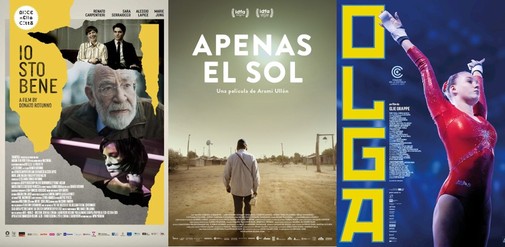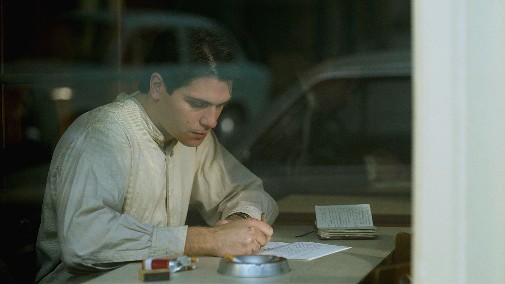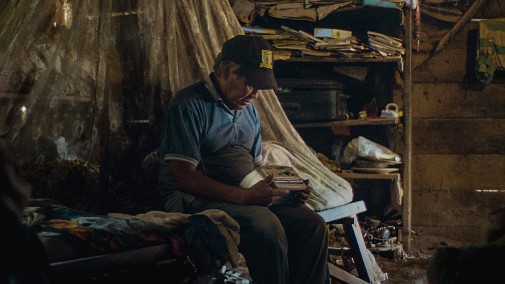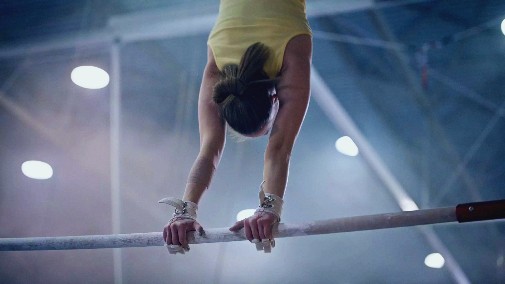Best International Film: Luxembourg, Paraguay, Switzerland
 Saturday, December 18, 2021 at 1:00AM
Saturday, December 18, 2021 at 1:00AM 
Instead of thinking about continental closeness, feminine authorship, or similar Oscar records, today's Best international Film submissions are bonded by a thematic link. The pictures selected to represent Luxembourg, Paraguay, and Switzerland all explore matters of displacement, whether through immigration or forced uprooting. They run the gamut, from fiction to documentary, from stories of economic precarity and political oppression to tales of colonial trauma. Though they're championing their countries in the Oscar race, these films consider the nations through complicated lenses and layers of otherness…

IO STO BENE (Luxembourg)
Antonio didn't think his move to Luxembourg was permanent. Not when he first went there, still a young man looking for job opportunities, for money with which to build a life back home in Italy. However, as it happens with many immigrants, a temporary stay quickly becomes a lifetime. When we meet the older Antonio, he's a long-time ex-pat, ready to face the autumn of his life. It's a time to accept retirement prizes, to ponder the loss of a beloved wife, to think of selling an old house and checking into a nursing home. It's time to find a place to get old, a place to die.
Io Sto Bene is a film about Antonio's memories, but it's also about his paternal friendship with a fellow Italian immigrant in Luxembourg. Crossing paths with a young DJ, Leo, the old man finds parts of his journey reflected in the woman's struggle to adapt. He also sees his wife in her, a conglomeration of identity reflections that makes Leo a sort of surrogate daughter. Throughout their shared story in contemporary Europe, director Donato Rotunno weaves flashbacks. Unfortunately, this decision unbalances the movie, making it so much about Antonio that Leo's role becomes more of a plot facilitator than an effective coprotagonist.
That being said, to cut the past out of Io Sto Bene would be to excise the film's best passages. Indeed, while there's a profound understanding underlying every modern scene, it feels as if the film is too timid about exploring the characters' interiority. The flashbacks are more conventional, leaning on romantic tonalities, but they're also more vivid and alive. Furthermore, the immigrant community is more of a presence, bringing important specificity to this tale. Antonio is haunted by his remembrance, reminders of a life lost. Intellectually, that yearning works but, dramatically, it results in a skewed narrative whose sincerity can sometimes dovetail into shallowness. B-

NOTHING BUT THE SUN (Paraguay)
Between two European fictions, we find the latest doc from Paraguayan director Arami Ullon. However, the differences to the other pictures don't stop there, extending to their treatment of dislocation. Here, the film deals with the aftermath of losing one's home, looking back in retrospection with no flashbacks or reconstructions. Going further still, it's a flick that doubles as an ethnographic project, if not an archeologic exercise. Nothing But the Sun is an homage to the Ayoreo people who were systematically uprooted from their native land and dropped in the Chaco region of Paraguay by white colonialists, predominantly Christian "well-doers."
To tell their story, the director focused her camera on Mateo Sobode Chiqueno, an old man who was taken to Chaco back when he was a preteen. Through his memories and, more importantly, a rickety tape recorder, we get to know a community, a culture, that generations of colonial oppression have pretty much eradicated. Sometimes, it wasn't even direct action that brought on the destruction, but infections and other maladies that missionaries carried with them. Such sickness decimated the native people. Their ghosts now speak through the decrepit tapes, and the film serves to amplify their voice. After all, to record something is to take care of it, to prolong its life through material recollection.
Maybe, Nothing But the Sun can perpetuate that collective memory of the Ayoreo just as Chiqueno's tapes do. Hopefully, it'll serve as more than a mournful lament, bringing attention to a mode of life and ancient tradition that's about to die along with these forgotten elders. Ullon's visual strategy highlights the urgency of her documentary endeavor by highlighting the ephemerous nature of everything the light touches. Animal carcasses desiccating under the desert sun are ominous reminders of mortality, but so are the wrinkled faces of the last Ayoreo alive. When they fill the frame, one can hear the song of a lost world trying to be heard, hoping they catch someone's ear before it's too late. B+

OLGA (Switzerland)
Director Elie Grappe's storytelling economy and moviemaking ingenuity are the most commendable facets of Olga, the story of a Ukrainian teen gymnast who moves to Switzerland in hopes of escaping the chaos unspooled by Euromaidan. Notice how a mother-daughter dynamic gets conveyed within a single car ride, abruptly disrupted by the spike of life-altering violence. Regard a well-deployed dissolve, mimicking the way a girl's mind gets enraptured by an internet video, by the scary news from back home. More impressively, there's the sports element of the movie, a young gymnast's relationship to the uneven bars, which consume her days, her mind, her body.
Instead of looking at her from a distance, we're always with Olga. We experience the exercise through an intimate audiovisual perspective. Her hands are at the center of it all, divorced from the surrounding world, muscular fragments of a person whose wavering grip reverberates through the screen. Their strength is beautiful, but there's always tension when the camera's attention gets caught in the effort. At any moment, Olga can slip. Fear grips us just as much as the fingers grip the bar, the possibility, maybe the desire, of oblivion. It's a poetic flourish within a film that uses them sparingly, preferring to be grounded to the realities of its protagonist's teenage angst. Olga keeps running away from melodrama despite amped-up anxieties, searching for anti-sentimentality.
Even when it indulges in the clichéd beats of sporting stories, it does so with a calculated coldness, considerable reticence. In some ways, this is an extension of Olga's closed-off personality, her insular isolation from new compatriots in a land whose language she can't even speak properly. Despite Grappe's virtuosity behind the camera, the elegance of Lucie Baudinaud's cinematography, and Suzana Pedro's editing, the film always feels constrained. It never goes far enough as a character study, which isn't helped by Anastasiia Budiaskina's performance. A real-life gymnast, she nails the physicality of the titular role. However, as the mise-en-scène is so intensely focused on close-ups, that's not enough. B
Oscar odds? Olga seems like one of those films that might unexpectedly pop up on the shortlist, though Switzerland hasn't had an excellent track record with AMPAS since the early 90s. Io Sto Bene could make it if its profile were more significant, but it's far too obscure as it is. Plus, Luxembourg has never been shortlisted since it started submitting in 1997. Finally, the Paraguayan doc is also eligible for Best Documentary Feature. In both Oscar races, Nothing But the Sun's chances feel null.



Reader Comments (1)
I realize that until something changes technologically to make huge screens the norm again (as opposed to iphones and ipads and the like) that we're stuck with a whole generation (or three) of directors who think close-ups are the only way to go... but I hear you on OLGA's problem there. Sometimes the camera really should be looking at the whole physicality rather than the eyes. (same problem when filming modern musicals actually)